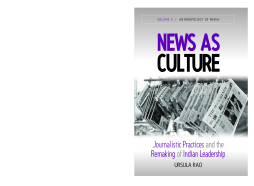
Additional Information
Book Details
Abstract
At the turn of the millennium, Indian journalism has undergone significant changes. The rapid commercialization of the press, together with an increase in literacy and political consciousness, has led to swift growth in the newspaper market but also changed the way news makers mediate politics. Positioned at a historical junction where India is clearly feeling the effects of market liberalization, this study demonstrates how journalists and informants interactively create new forms of political action and consciousness. The book explores English and Hindi newsmaking and investigates the creation of news relations during the production process and how they affect political images and leadership traditions. It moves beyond the news-room to outline the role of journalists in urban society, the social lives of news texts and the way citizens bring their ideas and desires to bear on the news discourse.
This important volume contributes to an emerging debate about the impact of the media on Indian society. Furthermore, it convincingly demonstrates the inseparable link between media related practices and dynamic cultural repertoires.
Ursula Rao is Professor of Anthropology at the University of Leipzig, Germany. Her research focus is urban life and cultural transformations. She works in the fields of Media Anthropology, E-Governance and Ritual Studies. Some of her recent English language publications are The Cultural Politics of Disadvantage in South Asia (Asian Studies Review, 33(4), edited together with Assa Doron); Making the Global City: Urban Citizenship at the Margins of Delhi (Ethnos 74(4): 402-424.); and Celebrating Transgression: Method and Politics in the Anthropological Study of Cultures (Berghahn, 2006).
“This is definitely a remarkable ethnography about more than ‘just’ newspaper politics in North India, and so a worthwhile read for scholars and students interested in urbanized middle-class discourses, media practice in a variety of local settings in contemporary India.” · Social Anthropology/Anthropologie sociale
“More than just a fascinating description of newsmaking and practice in an Indian city, this book has implications for theories of news and communication that make it a timely and significant contribution to the literature on journalism and newsmaking in the changing global environment.” · Mark Allen Peterson, Miami University
“The book is written in an accessible style…The author skillfully navigated a particularly challenging ethnographic field and has produced a work demonstrating thorough, firsthand knowledge of the complex and often hidden mechanisms of news production in contemporary India. Extensive engagement with secondary literature in English and German renders the book particularly useful to students and specialists of the media from various disciplinary backgrounds.” · H-Net Reviews
Table of Contents
| Section Title | Page | Action | Price |
|---|---|---|---|
| Cover | Cover | ||
| News as Culture | i | ||
| Table of Contents | v | ||
| List of Abbreviations | vii | ||
| List of Figures and Tables | ix | ||
| Acknowledgements | xi | ||
| Chapter 1: Introduction | 1 | ||
| Chapter 2: Lucknow News | 21 | ||
| Chapter 3: Local Voices | 45 | ||
| Chapter 4: Political Reporting | 91 | ||
| Chapter 5: Infotainment | 143 | ||
| Conclusions | 193 | ||
| References | 203 | ||
| Index | 217 |
